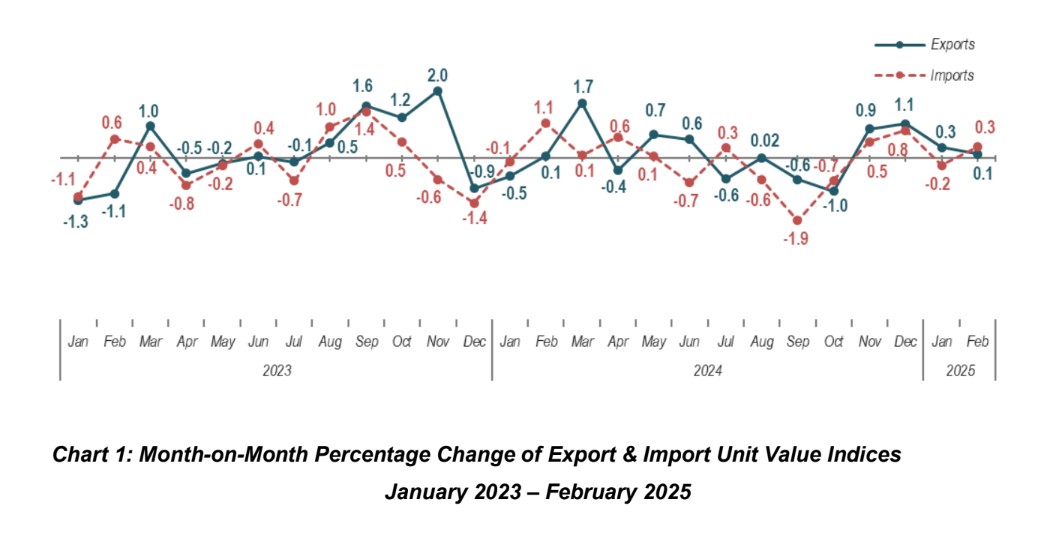Malaysia experienced a modest rise in export and import prices in February 2025, with the export unit value index climbing by 0.1 per cent from 151.2 to 151.4 points. Likewise, the import unit value index recorded a 0.3 per cent increase, moving from 127.7 to 128.1 points. Despite these gains, the nation’s terms of trade registered a slight decline of 0.2 per cent month-on-month, falling to 118.2 points. These findings were released in the External Trade Indices (2010=100) report for February 2025, which details the movement of unit value, volume, and trade terms across ten major product groups according to the Standard International Trade Classification (SITC).
Chief Statistician Malaysia, Dato’ Sri Dr. Mohd Uzir Mahidin, noted that the improvement in export prices was mainly due to increases in the indices of mineral fuels, which rose by 2.5 per cent, followed by food at 0.7 per cent and miscellaneous manufactured goods at 0.6 per cent. However, the export volume index experienced a decline of 3.8 per cent, primarily due to sharp reductions in the volume of mineral fuels by 12.4 per cent, animal and vegetable oils and fats by 5.0 per cent, and machinery and transport equipment by 4.7 per cent. Nevertheless, when adjusted seasonally, the export volume index grew by 2.3 per cent, rising from 159.2 to 162.8 points. Compared to the same month last year, both export value and volume indices rose by 2.8 per cent and 3.3 per cent, respectively.
As for imports, the 0.3 per cent increase in the unit value index was largely driven by higher prices in mineral fuels, miscellaneous manufactured goods, and food. However, Malaysia saw a substantial drop of 11.6 per cent in its import volume index for February 2025, due to lower imports of manufactured items (down 17.9 per cent), machinery and transport equipment (down 15.9 per cent), and miscellaneous goods (down 11.4 per cent). Seasonally adjusted figures also reflected a 2.0 per cent decrease in the import volume index, which dropped from 212.9 to 208.7 points. On a year-on-year basis, the import unit value index declined by 1.4 per cent, although the volume index increased by 7.0 per cent.
The slight month-on-month decline of 0.2 per cent in Malaysia’s terms of trade in February was mainly caused by falling indices in animal and vegetable oils and fats (down 2.0 per cent), machinery and transport equipment (down 0.5 per cent), and manufactured items (down 0.1 per cent). Nonetheless, compared to February 2024, the terms of trade showed an encouraging year-on-year growth of 4.2 per cent, rising from 113.4 to 118.2 points.
In regional news, Malaysia is set to lead the 15th ASEAN Community Statistical System Committee (ACSS15) this year, as part of its ASEAN 2025 Chairmanship. This initiative aims to strengthen regional collaboration in data and statistics to support sustainable development goals.
The Malaysian government has also reaffirmed its commitment to statistical literacy by designating October 20th as National Statistics Day (MyStats Day), celebrated under the theme “Statistics is the Essence of Life.” In the same spirit, World Statistics Day will be marked globally on 20 October 2025 with the theme “Driving Change with Quality Statistics and Data for Everyone.”
To make national statistics more accessible, the Department of Statistics Malaysia (DOSM) provides a user-friendly data platform, OpenDOSM NextGen. This digital platform offers interactive data visualisations and is available at https://open.dosm.gov.my.









